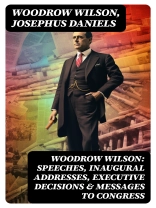This comprehensive anthology titled ‘Woodrow Wilson: Speeches, Inaugural Addresses, Executive Decisions & Messages to Congress’ presents an incisive exploration into the diverse rhetorical landscape of one of America’s pivotal historical figures. The collection builds a rich tapestry of the early 20th-century political ethos through Wilson’s speeches and public communications, reflecting the intricate dynamics of wartime leadership, domestic reform, and international diplomacy. Notable segments within the anthology include landmark addresses on the League of Nations and the Fourteen Points, emphasizing Wilson’s vision for peace and collective security. The diversity of styles, from persuasive oratory to concise executive decisions, punctuates the gravity and eloquence of Wilson’s public life, making this anthology a crucial resource for understanding the era’s political lexicon. The anthology benefits significantly from the editorial insights of Josephus Daniels, Wilson’s close contemporary and a notable contributor to the literary and political dialogue of the times. Daniels’ contributions amplify the thematic focus on progressive reform and wartime exigencies, offering a panoramic view of the socio-political landscape painted by these historical authors. This convergence of voices from the Progressive Era underscores the anthology’s alignment with progressive movements that sought widespread social and economic reform, thus illuminating the dialogue between innovation and tradition in American political thought. This enlightening collection invites readers to journey through a crucial chapter in American history, engaging with perspectives and speeches that shaped modern governance. Whether as a tool for academic study or personal enrichment, the anthology unveils the formative dialogues of Wilson’s political agenda and the intricate interplay of policy with global and domestic affairs. It is a recommended read for scholars, history enthusiasts, and anyone compelled by the evolution of political rhetoric, enriched by Daniels’ editorial stewardship and the timeless relevance of Wilson’s words. Together, these documents foster a deeper comprehension of the complex, interwoven narratives that defined a transformative period in history.
Over de auteur
Woodrow Wilson, the 28th President of the United States, was an accomplished scholar, educator, and statesman whose written works reflect the meticulous mind that would one day lead the nation. Before his presidency, Wilson had already distinguished himself as a political scientist and a public intellectual. His erudition was evident in his seminal work ‘Congressional Government: A Study in American Politics’ (1885), heralding his reputation as a profound thinker in political science and democratic governance. Known for a progressive vision and articulate expression, Wilson’s literary corpus extended to his presidential years, as encapsulated in his collection ‘Woodrow Wilson: Speeches, Inaugural Addresses, Executive Decisions & Messages to Congress’, chronicling key moments of his leadership in shaping modern America. The book allows readers to traverse the ideological landscape that Wilson navigated, characterized by a firm belief in internationalism and the principle of self-determination, leading to his pivotal role in the founding of the League of Nations. His speeches exhibit a nuanced blend of idealism and pragmatism—a clear demonstration of the literary finesse and oratorical skills that defined his presidential tenure and his wider contributions to American political thought.












